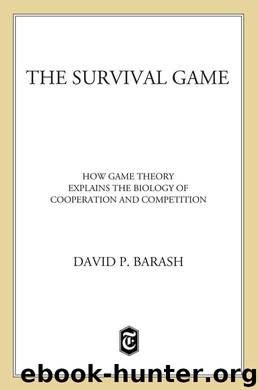The Survival Game: How Game Theory Explains the Biology of Cooperation and Competition by Barash Ph.D. David P

Author:Barash Ph.D., David P.
Language: eng
Format: epub
Publisher: Henry Holt and Co.
Published: 2004-09-01T00:00:00+00:00
Such pessimism isn’t only a product of twentieth-century scholarship. “What is common to the greatest number gets the least amount of care,” wrote Aristotle, in his Politics. “Men pay most attention to what is their own; they care less for what is [held in] common.”
When psychologists have gotten into the fray—something that has only happened seriously in recent years—they have usefully muddied the waters, adding a bit of human complexity to Olson and Hardin’s logical constructs and the dire warnings of political philosophers from Aristotle to Rousseau. Fortunately, for those of us who worry about the dangerous, seductive lure of social dilemmas, the pictures that psychologists paint have been considerably more hopeful, even as they add some maddening complications.
First of all, even though social psychologists recognize the formal similarities between social dilemmas and Prisoner’s Dilemma, they are also inclined to point out some important differences. In Prisoner’s Dilemma, for example, the cost of defection is borne entirely by the other player; in social dilemmas, it is distributed across a large group, including the player herself, which could make the social opprobrium of defection somewhat greater. Also, because social dilemmas are played, by definition, against a social group, the decision to cooperate or defect is anonymous, or nearly so—assuming you don’t get caught. By contrast, each participant in a Prisoner’s Dilemma is unambiguously connected to his or her most recent move. On the other hand, in repeated games of Prisoner’s Dilemma, each player has at least the possibility of influencing the behavior of the other, not directly of course (the nature of “games” requires that players have no immediate control over each other), but indirectly, by rewarding—either positively or negatively—the other player’s behavior. In repeated games of Prisoner’s Dilemma, for example, a cooperator can be rewarded in the next game by receiving cooperation, just as a defector can be punished by a retaliatory defection. Such a relationship, fundamental to strategies like TIT-FOR-TAT, is difficult to obtain in social dilemmas.
According to psychologists who study the phenomenon, anonymity is important. Several decades ago, a young woman named Kitty Genovese was brutally attacked and murdered by a knife-wielding assailant. Despite her screams, which were heard by several dozen people in her New York City neighborhood, no one intervened. Not even to call the police. This failure of “bystander intervention” generated a wealth of research by social psychologists, eager to understand why people didn’t help. In a sense, each bystander was faced with a social dilemma: whether to intervene or not, and even, at much less personal cost, whether to phone the police or not, while not knowing what others might do. One finding: The larger the bystander group, the less likely that an individual will “cooperate.” Everyone thinks—or hopes—that someone else will take the lead, thereby conveying a whiff of coordination games, such as the Interrupted Telephone Call, although with more sinister consequences. With large bystander groups, responsibility can be so diffused as to be essentially absent altogether. (It usually isn’t terribly serious, by contrast, if no one initiates a callback after an interrupted phone conversation.
Download
This site does not store any files on its server. We only index and link to content provided by other sites. Please contact the content providers to delete copyright contents if any and email us, we'll remove relevant links or contents immediately.
Modelling of Convective Heat and Mass Transfer in Rotating Flows by Igor V. Shevchuk(6421)
Weapons of Math Destruction by Cathy O'Neil(6249)
Factfulness: Ten Reasons We're Wrong About the World – and Why Things Are Better Than You Think by Hans Rosling(4724)
A Mind For Numbers: How to Excel at Math and Science (Even If You Flunked Algebra) by Barbara Oakley(3288)
Descartes' Error by Antonio Damasio(3261)
Factfulness_Ten Reasons We're Wrong About the World_and Why Things Are Better Than You Think by Hans Rosling(3224)
TCP IP by Todd Lammle(3170)
Fooled by Randomness: The Hidden Role of Chance in Life and in the Markets by Nassim Nicholas Taleb(3091)
Applied Predictive Modeling by Max Kuhn & Kjell Johnson(3050)
The Tyranny of Metrics by Jerry Z. Muller(3049)
The Book of Numbers by Peter Bentley(2955)
The Great Unknown by Marcus du Sautoy(2676)
Once Upon an Algorithm by Martin Erwig(2638)
Easy Algebra Step-by-Step by Sandra Luna McCune(2619)
Lady Luck by Kristen Ashley(2568)
Practical Guide To Principal Component Methods in R (Multivariate Analysis Book 2) by Alboukadel Kassambara(2529)
Police Exams Prep 2018-2019 by Kaplan Test Prep(2527)
All Things Reconsidered by Bill Thompson III(2381)
Linear Time-Invariant Systems, Behaviors and Modules by Ulrich Oberst & Martin Scheicher & Ingrid Scheicher(2356)
